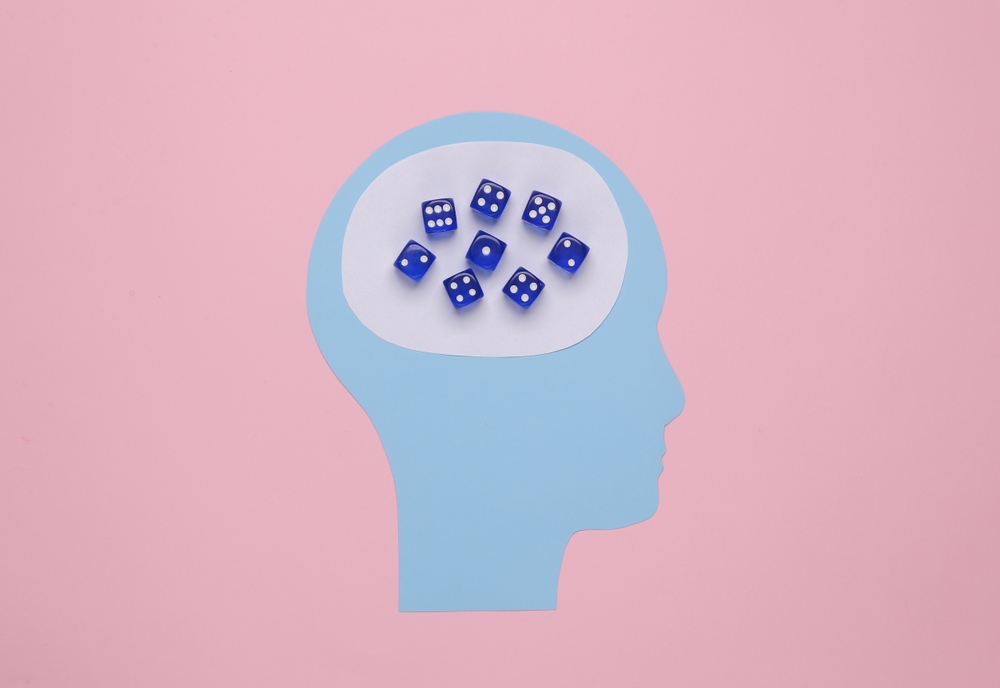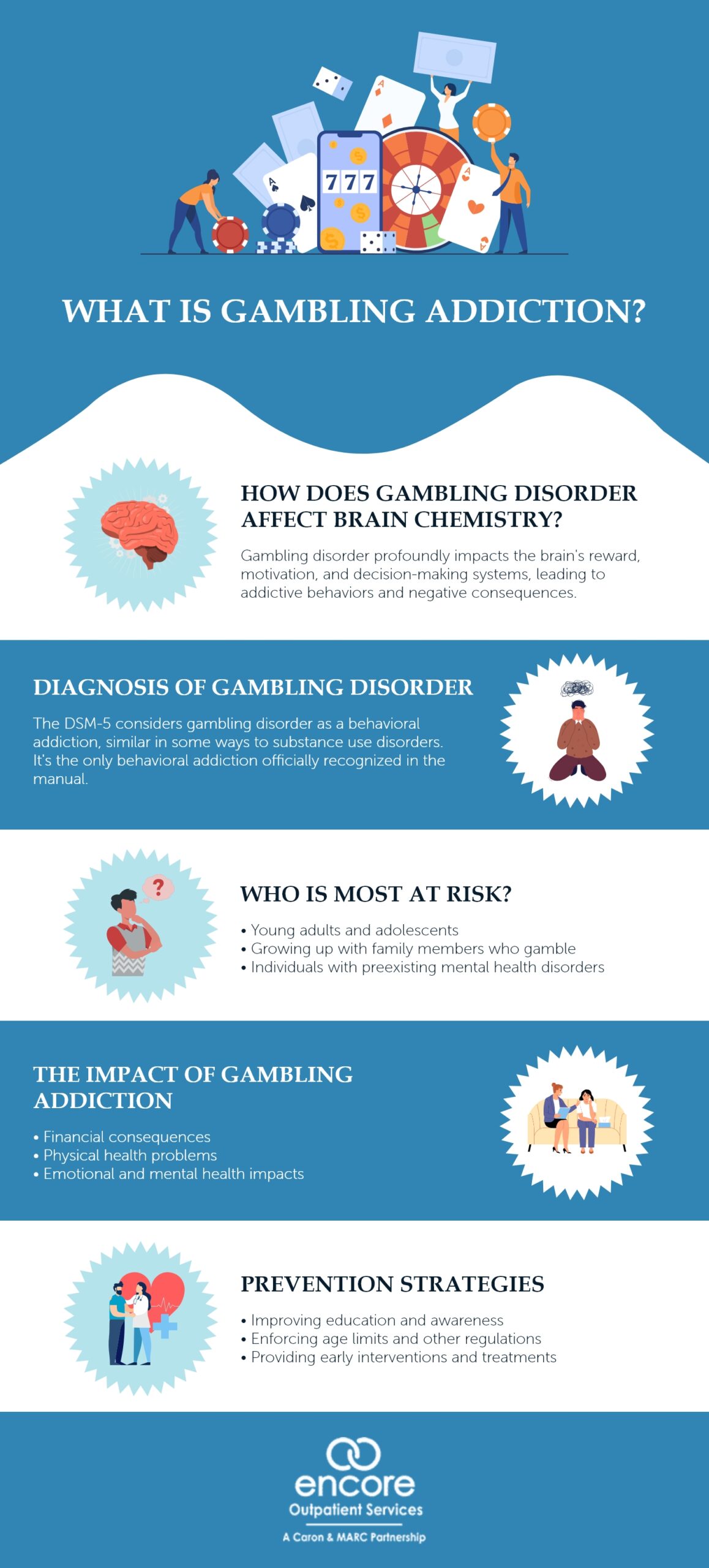Our dedication lies not just in treating symptoms but in addressing the root causes, offering a holistic approach that integrates the best of therapeutic practices with the warmth of community support.

Gambling addiction, also known as compulsive gambling or gambling disorder, is a serious mental health condition that affects millions of people worldwide. It involves an uncontrollable urge to gamble despite negative consequences. This leads to significant disruptions in personal, professional, and financial aspects of life.
Understanding the true nature of gambling addiction is the first step in recognizing and addressing this behavioral challenge.
Gambling disorder profoundly impacts the brain’s reward, motivation, and decision-making systems, leading to addictive behaviors and negative consequences.
When a person gambles, the brain releases dopamine, a neurotransmitter associated with pleasure and reward. This release creates a sense of euphoria and reinforces the behavior, encouraging repeated gambling.
Over time, individuals may develop a tolerance, needing to gamble more frequently or with higher stakes to achieve the same level of dopamine release. This destructive cycle can lead to changes in brain structure and function, particularly in areas related to decision-making, impulse control, and reward processing.
The prefrontal cortex, which is responsible for rational decision-making and impulse control, may also become less active, making it harder to resist the urge to gamble. This imbalance between the brain’s reward system and impulse control mechanisms contributes to the compulsive behaviors seen in gambling disorder.
Understanding these changes in brain chemistry helps explain why gambling disorders can be challenging to overcome and highlights the need for effective treatment strategies.

According to the American Psychiatric Association (APA), the DSM-5 considers gambling disorder as a behavioral addiction, similar in some ways to substance use disorders. It’s the only behavioral addiction officially recognized in the manual.
A diagnosis of gambling disorder requires at least four of the following criteria within a 12-month period:
Understanding these signs can aid in identifying a gambling addiction and seeking appropriate help.
Here’s a list of different types of gamblers and their risk of developing a gambling addiction:
Understanding the types and risk levels helps in identifying potential problems early and taking appropriate measures to prevent or address gambling addiction.
Gambling is widely regarded as a fun and socially acceptable recreational activity. However, there is a fine line between recreational gambling and compulsive gambling.
According to The Yale Ledger, 96% to 98% of individuals fall into the recreational gambling or social gambling category. Individuals who engage in recreational gambling primarily do it for fun, excitement, social interaction, and the challenge of skill-based games.
In contrast, problem or pathological gamblers exhibit addictive behaviors and gamble at a greater frequency. They generally gamble at casinos, play the lottery, and gamble online. According to a recent report published by the National Library of Medicine (NIM), pathological gambling affects around 2.9% of the adult population.
While the prevalence of problem or compulsive gambling is far lower than that of recreational gambling, gambling behaviors seem to be increasing significantly among certain demographics.
Since the legalization of sports betting in many states and targeted marketing by the industry, expanded access to gambling opportunities has led to concerning gambling trends. This trend highlights the need for enhanced prevention and professional treatment efforts.
Certain groups are more vulnerable to developing a gambling addiction due to various risk factors. These include:
Understanding these risk factors can help in identifying and supporting individuals who may be at higher risk of developing a gambling addiction.
Gambling addiction can have damaging effects on an individual’s finances, mental health, relationships, and overall quality of life.
Understanding these impacts is crucial for recognizing the severity of gambling addiction and the importance of seeking help and support.
Gambling disorder is a diagnosable chronic mental health condition similar to substance use disorders. Despite this, it’s a topic that’s rarely discussed. While most people understand and sympathize with the struggles of drug and alcohol addiction, they often view gambling as a lesser evil. However, the symptoms of problem gambling and substance use disorders are very similar, with both associated with higher rates of depression, anxiety, and suicidal behavior.
The stigma surrounding gambling addiction often prevents individuals from seeking the help they need. Many people perceive gambling addiction as a lack of self-control or a moral failing rather than a legitimate mental health disorder. This misconception can make individuals reluctant to admit their problem or seek treatment.
This societal attitude discourages open discussions about gambling addiction, further isolating those who suffer from it. This isolation can exacerbate the condition, as individuals may feel unsupported and misunderstood.
Reducing stigma is crucial for encouraging individuals to seek help and for fostering a more supportive environment. Education and awareness campaigns can help shift perceptions, highlighting that gambling addiction is a serious and treatable condition, similar to other mental health disorders.
Here are some key prevention strategies:
By focusing on these strategies, it’s possible to mitigate the risks associated with gambling and support individuals in maintaining healthy behaviors.
Recognizing the need for help is the first step toward overcoming gambling addiction. Individuals experiencing gambling problems should consider the following options:
Seeking help early can prevent the escalation of gambling problems and lead to long-term wellness. It’s important to find the right combination of support and treatment tailored to individual needs.
If you or a loved one is struggling with gambling addiction, Encore Outpatient Services can provide the support and treatment you need. Our experienced medical providers offer personalized care and a range of effective therapies to help you regain control of your life.
We offer various levels of care, including partial hospitalization (PHP), intensive outpatient (IOP), and general outpatient programs (GOP) for addiction and co-occurring disorders. To learn more about how our programs can support your recovery goals, schedule a consultation with us today.
Copyright 2025 Encore Recovery | All Rights Reserved